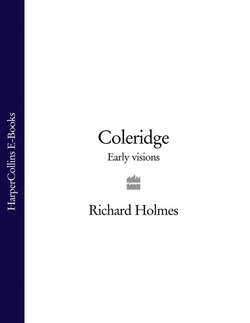Читать книгу Coleridge: Early Visions - Richard Holmes - Страница 19
3
ОглавлениеAt this period Christ’s Hospital was sharply distinguished from the great public schools such as Eton (attended by Shelley), Harrow (Byron) or Westminster (Southey), with their aristocratic connections, anarchic regimes, and in-built sense of class privileges. There were no riots, no underground magazines, no tutorial friendships between boys and masters, no freedoms outside school hours. It was a highly conservative institution, largely funded by philanthropists from the City of London, with spartan facilities and food, lengthy church attendances, and strictly practical aims for most of its pupils.
The main building, founded by Edward VI in 1552, on the site of a Franciscan friary, stood on Newgate Street close to the prison burnt down by the Gordon Rioters in 1780. To the south rose the dome of St Paul’s, to the east was the Bank of England, to the west the Smithfield Meat Market and the Inns of Court. The boys ate together in the Great Hall with pictures of its benefactors gazing down upon them, attended the church in a special gallery above the nave, and played in a walled and cloistered courtyard. Except on leave-days they were forbidden to go out into the city streets – though there are early records of Coleridge’s truancy – and there was a single long vacation of three weeks during the summer.
Of the three main school divisions, the Writing School prepared boys for commercial apprenticeships at the age of fourteen or fifteen; the Mathematical and Drawings Schools sent boys into the navy and the East India Company at the age of sixteen; and the Grammar School retained the brightest pupils for professional careers in the law, the army, or the Church. The most gifted of these, directly supervised by James Bowyer, were put into a Classical Sixth Form, known as the Deputy Grecians, and from there three or four boys a year – distinguished as the Grecians, with special uniforms and privileges – would go on to Oxford or Cambridge.
The powerful sense of intellectual hierarchy, which affected Coleridge for the rest of his life, inculcated fear and respect for all social authority. When a Grecian walked through the cloisters every other boy was expected to get out of his way. All discipline was enforced by Bowyer with savage and frequent flogging. There was great rivalry between the boys concerning the social standing of parents, and outside gifts of food and money – well reflected in Coleridge’s letters. Nearly half the boys were “orphans” (usually from a widowed family), and the daily Christ’s Hospital hymn referred humiliatingly to their charity status. Coleridge’s frequent references to himself as an orphan, poor and neglected, partly reflect this intense consciousness of status throughout his time at Christ’s Hospital.
Despite the severity of the institution – or perhaps because of it – the school did produce at this time a number of notable literary men and scholars, all from the ranks of the Grecians. Among these were Charles Lamb, Leigh Hunt, the poet George Dyer, Thomas Barnes (the future editor of The Times), and Thomas Middleton (a classical scholar who became the first Bishop of Calcutta). Of these, Lamb and Middleton were Coleridge’s fellow pupils, the former two years junior, the latter two years senior. All retained vivid and painful memories of Christ’s Hospital.
Lamb, who would later become one of Coleridge’s most faithful friends and confidants, touchingly projected himself into the older boy’s homesickness. In “Christs Hospital Five-and-Thirty Years Ago” (1820), Lamb – as Elia – wrote in Coleridge’s imagined voice of schoolboy grief: “My parents and those who should care for me were far away…How, in my dreams, would my native town (far in the west) come back, with its church, and trees, and faces! How I would wake weeping, and in the anguish of my heart exclaim upon sweet Calne in Wiltshire!” Lamb altered Ottery to Calne (the Wiltshire town where Coleridge wrote his own memoirs of Christ’s Hospital in the Biographia) to avoid upsetting the Ottery Coleridges with accusations of – perhaps romanticised – neglect.
